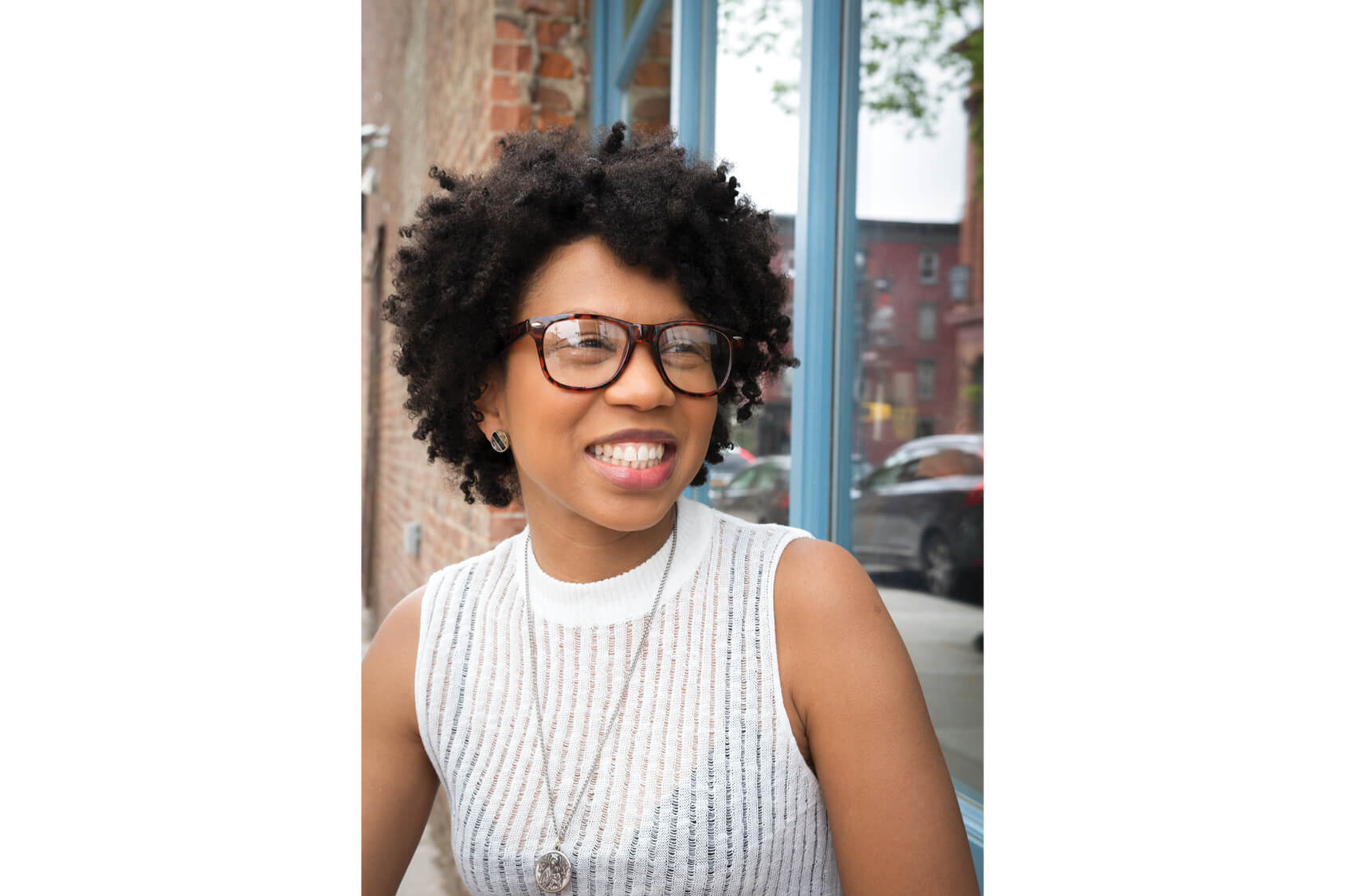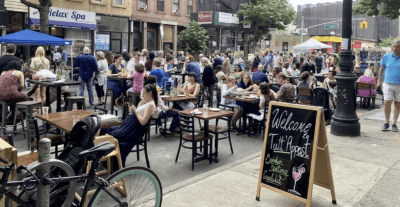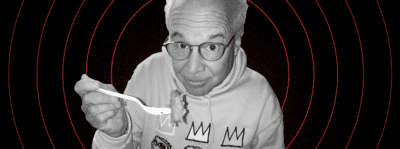Glory Edim is the Future of Reading
In a private room of the Central Branch of Brooklyn Public Library, a group of 20-or-so women sit around a table to ask questions of Yaa Gyasi, the debut author of Homegoing. In another hour, Gyasi will appear in front of a much larger audience in the library’s auditorium—to read and discuss the book with Pulitzer Prize winning poet, Tracy K. Smith, but for now she’s all theirs. It’s a privilege of being in the club.
At the ninth meeting of Well-Read Black Girl, a monthly, Brooklyn-based book club and ever-present online community, its members grapple with the tantalizing aspects of Homegoing’s structure: Each chapter follows a different descending relative in a transatlantic family tree and their stories can sometimes feel too short. One woman asked if anyone else had seen the new remake of Roots, which has a similar narrative format and subject matter.
“I was watching Roots while reading it!” another groans.
“Double whammie!” says a third, laughing.
New York is experiencing a golden age of book clubs. These aren’t the meetings you might have seen on TV—set in suburban living rooms, watered by buckets of white wine, books serving as thin excuses for gossip. (Though that sounds like a lot of fun too! Save me some chardonnay!) A new generation of book clubs, they are—for the most part—more formalized, more public, and led by a charismatic and visionary organizer. They are also enormously popular (for a recent meeting of Yahdon Israel’s Literary Swag Book Club in Washington Square Park, one particular participant had taken a bus all the way from DC just for the event). Well-Read Black Girl, founded by self-professed book nerd, Glory Edim, is the most successful of this new wave: a little literary utopia, a place where books by black women writers are celebrated, discussed, and absorbed.
Edim is the sort of person who is always working on a project. She tells me about the various websites she’s started over the years. “I had a website back in the day called ‘I Hate My 9 to 5,’” she says one afternoon at Cassette, a cafe a few doors down from her employer’s (Kickstarter) Greenpoint office. The long-defunct blog doesn’t refer to her current job, which she started in March. Edim created another one, “Paper Collective,” that was origami-themed. It’s a surprise, then, that Well-Read Black Girl came about by accident. The name itself was a kind of present: Her boyfriend had made Edim a t-shirt that read “Well-Read Black Girl” for her birthday. The design, mocked up to look like a university seal, perfectly described her. “I would be out in public and people would be like, ‘Where do I get your shirt?’ I was like, oh, people really love this. How can I make this real life?”
Edim has built a formidable presence for Well-Read Black Girl both on and offline. First, she started the hashtag. Second, she started an Instagram and Twitter account. Then she got on TinyLetter. “The more people responded with comments online, the more I was like, “This is a thing.” Bolstered by the response, Edim started planning the in-person book club meetings. “You know when you are reading a good book and just flipping through the pages and going and going?” she asks as a way of explanation. “To share that excitement in person, that’s the best.”
A native of Arlington, Virginia, Edim went to Howard University and lived in Washington D.C. before moving to New York in 2012. Though Edim neither works (nor wants to) in publishing or media, books remain central to her identity. “I started reading when I was three,” she recalls. “I was a little bit of a recluse growing up, under the covers with a flashlight and a book. It was a little bit difficult for me to make friends as a young person, so books were my friends.”
“My Mom is a super library fanatic,” Edim adds, laughing. “We went to the library every two seconds.”
She talks about how her reading has evolved since her early years of reading The Baby-Sitters Club beneath a blanket. She credits Howard University for introducing her to the books that are now most important to her. “That was the first time I really read all those Zora Neale Hurston books all at once. I read so much Alice Walker, Audre Lorde, bell hooks,” Edim remembers. “After my first breakup I read Salvation like 45 times.”
“In a way I was really obsessive,” she says, “trying to put their words into practice in my life. This is more than just reading for enjoyment—it’s shaping my values. Literature has made me the woman I am.”
This ethos—that literature makes us who we are—deeply informs Well-Read Black Girl. The club meets monthly and since its inception, with two exceptions, focuses on novels by black women. The monthly discussions have various times and locations—often, by design, hosted at businesses owned by black women—so participants are encouraged to sign up for the newsletter for upcoming meeting information. Edim also organized a packed Well-Read Black Girl reading this past February at Housing Works, featuring writers like Ashley Ford, Jenna Wortham, and Morgan Parker, among many others. It also manages (on top of everything else) to put together occasional short videos of her book club meetings.
“In Brooklyn, weirdly enough, there’re not that many venues for black writers to read,” observes novelist and National Book Award-finalist Angela Flournoy. Her debut novel, The Turner House, was the November pick for Well-Read Black Girl. “Particularly with Glory’s group, it’s people I don’t normally see at readings. And they seemed to be getting more out of it.”
Book club member Carla Bruce-Eddings, who first met Edim through her husband (both are Howard alums), credits Edim herself as a major draw. “She is such a genuine, down-to-earth person who makes her passions known but isn’t pushy or over-the-top,” Bruce-Eddings says. “She’s just always trying to be her best self and gently encourage you to do the same. It’s the kind of energy that draws people in.”
“It’s weird to even talk to you about it,” Edim says of her own motivations for creating Well-Read Black Girl, “because I feel like it was totally a selfish reason. I just wanted to read and have friends.”
The book club first got together in August 2015. They read Ta-Nehisi Coates’s Between the World and Me, to date the only title by a man the club has read (Edim laughs when I mention this). “It was my friends, a couple people who found out through the newsletter or through Twitter.” The book club really hit its stride with its next meeting in September. Edim attended a reading at Greenlight Bookstore for Naomi Jackson’s novel, The Star Side of Bird Hill. “It was completely random,” Edim says. “She signed my book and afterwards I was like, ‘Hey would you like to come to my book club?’ Not really expecting her to say yes.” Jackson did.
Eight or nine people met on the patio of the Classon Avenue bar Friends and Lovers. “We talked a lot about sisterhood and this idea of: Why did you write this book? Who were you talking to? And that’s when she said, ‘I was talking to young black women. I was talking to you women in this circle. Everyone sitting here. This book was written for you.’”
“Jackson’s response and her energy made me feel like, oh, I can approach more people. I can ask that question and people will say yes.”
Memoirist and Pulitzer Prize winning critic, Margo Jefferson, came in December. “The fact that she said yes,” Edim says smiling, “I was screaming. I had no idea what to do with myself. Here’s this woman I’d admired from afar for years and now I’m sitting next to her moderating a conversation. It built my self-confidence. There’s a space for this in the world.”
Though participation varies from month to month—all events are open to the public—the vast majority of the audience is black women ranging from their late teens to middle age. Edim recalls one instance where a college student brought her mother, who happened to be in town, along with her. “It’s definitely cross-generational,” she says. Men have shown up, Edim adds, “which they are more than welcome to. This is an open space.”
The openness of Well-Read Black Girl to all is important to her; it’s something Edim mentions again and again. But she also recognizes that with Well-Read Black Girl she’s helped foster a space that black women in particular feel comfortable in, and (rightfully) she doesn’t want that to change. Edim references an FAQ she has posted on her website, which reads in part: “You don’t have to be Black to join the book club, however, you should be an ally. Our discussions will center on women of color.” It also includes a link to a YouTube video by Nightly Show writer Franchesca Ramsey titled “5 Tips for Being an Ally.” (In sum: listen.) “In my rules,” Edim says, “I do mention that if you’re going be here, you need to respect the space and know your agency. If you are going to contribute, make sure it’s something worthy of contribution. Not just to cause controversy.” Thankfully it’s a problem that Edim hasn’t had to worry about so far. “Everyone’s been super super genuine,” she says.
When asked about how she chooses the books for the club, Edim says, “I really think about who deserves recognition, and how can I bring recognition in a way that’s very thoughtful.” Her focus is without apology on black women writers. As she explains it, Well-Read Black Girl asks: “What are we writing, and why is it important? Why is it important for everyone to read?” Underlying these questions is also a plain desire to read great books. “I am a reader,” Edim says, “I am not looking at it from the angle of what’s going to sell, what’s not.”
“I’m trying to be very cognizant of new books and finding contemporary writers,” Edim continues. “We can’t just rely on Toni and Alice and Zora. These women are the foundation, but what does the next generation look like? How can we uplift that? Angela is phenomenal. Naomi is phenomenal. These are women who will be with us a very long time and create even more work.”
“I can tell in the next 10 years we’ll be reading Yaa Gyasi.”
“The way that it’s packaged—it’s a little bit more formal feeling,” Flournoy says of her experience at Well-Read Black Girl’s November discussion of The Turner House. “It’s not just a group of friends who are meeting to talk about a book but don’t really talk about the book. That has contributed to its quick success.” In addition to this sense of purpose, Flournoy also pointed to Edim’s branding savvy. “The video she made after my event—for the longest it was the only video of me on the Internet.” It looks sharp, she says. “I was happy, actually, for that to be the only video of me on the Internet.”
“One of the things that usually happens [at book clubs], you spend a lot of time talking on a plot level—just what happens,” Flournoy adds. “People talk about your characters as if they are real. Glory tries to make connections between what you’ve written and larger issues. In my meeting, we talked about mental health in the black community, the idea of intergenerational trauma or experiences.”

Bruce-Eddings elaborates on this point: “In the face of structural inequality, domestic terrorism, state-sanctioned killing, every day micro-aggressions, and this election season from hell, it would seem natural, and completely justified, to come together and commiserate, complain, and cry on each others’ shoulders as a way of seeking relief, seeking solutions.” They do talk about issues that pertain to the books, she says, “but the overall tone of every event, every interaction with each other (and especially Glory) is just pure joy.”
“Every gathering is a celebration,” Bruce-Eddings adds. “Every woman you meet has a story to tell, has dreams to share, and it’s a pleasure to both bear witness and participate. We laugh—a lot. We swap stories and accomplishments. I leave every meeting feeling completely refreshed.”
Since the enormous and positive response to Well-Read Black Girl, Edim finds herself wondering at the vacuum her book club occupies. “I’m so surprised this”—a space that prioritizes black women readers—“doesn’t exist already,” she says. “It baffles me.” (It is baffling—college educated black women are the biggest readers in the country) Still, the success of Well-Read Black Girl is testament to Edim’s literary and community-building instructs: She saw an empty space and she filled it.
For Bruce-Eddings, Edim succeeded on both fronts. Well-Read Black Girl, she says, is “just the kind of community I desperately sought when I was in college, and when I first moved to New York City—although, to be honest, the reality has way surpassed my fantasy.”
Looking forward, Edim is all ideas. She’s moderating a Q&A with National Book Award winner Jacqueline Woodson at Medgar Evers College on October 13. She’s thinking about hosting an one-day literary festival. Starting a video storytelling project. Founding a formal organization.
“It’s a lot of work and energy just to organize all my things,” she admits. “In the last newsletter I wrote I was like, ‘Hey guys, I just started a new job.’ The assumption is that I’m a group of people, but it’s really just me behind a keyboard. I’m really frank: Sometimes there will be typos, sometimes this won’t come exactly at 4 o’clock every Friday, but I’m here. If you reach out to me, I’ll meet you for coffee. We’ll talk about books. It’s as simple as that. I’m not an LLC. I think those things are coming, but now I’m just trying to stay true to myself.”
“I love Oprah.” Edim says, her eyes (and mine too I suspect) lighting up. “I want to be an Oprah Book Club for the young.” That’s how high she’s reaching. She looks like she’ll make it. ♦
Photos by Jane Bruce
You might also like 



















